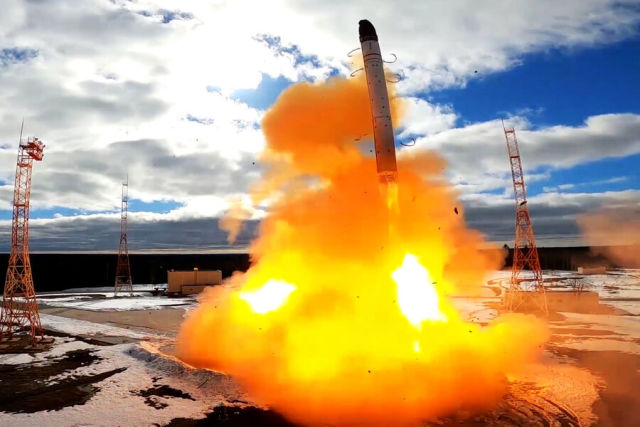General Yesin said that Sarmat missiles have already been produced "in due quantity" Russia plans to carry out the second test launch of the newest heavy intercontinental ballistic missile (ICBM) "Sarmat" by the end of 2022.
According to a TASS source, after evaluating the tests of this launch, a decision will be made on the deployment of the first missile regiment with Sarmatians. The former Chief of the General Staff of the Strategic Missile Forces, Colonel-General Viktor Yesin, told the newspaper.Ru" that the products are already ready and after testing the missiles can be deployed on combat duty within a month.
Russian President Vladimir Putin announced the development of the Russian Sarmat ICBM back in March 2018. The arrival of this missile system was somewhat delayed, including due to the lack of a number of Ukrainian components and the use of new technological solutions in the production of ICBMs at the Krasnoyarsk Mechanical Plant, "Gazeta said.En" Colonel-General Viktor Yesin.
Now "Sarmat" is in a high degree of readiness to take up combat duty. As Defense Minister Sergei Shoigu stated, the tests of this ICBM will be completed in 2022. The first of them were successfully held on April 20, the second, according to a TASS source close to the military department, may take place before the end of this year, after which they will be manned by the first missile regiment of the Strategic Missile Forces.
"According to the directive of the Ministry of Defense, the adoption of the Sarmatians into service should take place before December 31 of this year," said the former chief of the General Staff of the Strategic Missile Forces, Colonel-General Viktor Yesin.
The last test launch is necessary to work out all control systems, prepare combat control points, and give the calculations a practical opportunity to familiarize themselves with the work of the new complexes."
It is assumed that the first serial samples of the Sarmat will be delivered to the 62nd in Uzhur of the Krasnoyarsk Territory and to the 13th missile Division in Yasny of the Orenburg region.
"These are just the profile divisions where the Sarmatians will replace the Voevoda ICBMs that have been in service since Soviet times," General Yesin said. "This does not mean that everything will be changed once, but first at the level of one regiment, and then gradually, so as not to affect the combat readiness of missile formations." By the way, a special test site was built for testing the Sarmat ICBM near the village of Severo-Yeniseisky in the Krasnoyarsk Territory, as Defense Minister Sergei Shoigu said. But the first test launch was carried out from the Plesetsk cosmodrome.
RS-28 Sarmat is a Russian advanced ground-based mine-based missile system with a heavy liquid ICBM capable of carrying nuclear charges. It has been developed since the 2000s by specialists of JSC "V. P. Makeev State Rocket Center" in the Chelyabinsk region (Miass). It is named after the nomadic tribes of the Sarmatians, who in the VI-IV centuries BC inhabited the territories of modern Russia, Ukraine and Kazakhstan.
It can be launched both through the North and South Poles for an unlimited range. But the main surprise, its filling, lies inside. We are talking about hypersonic warheads, known under the code Yu-71, called "Avangard". Now these warheads are partially equipped with the Voevoda ICBM. Each of the ten combat units equipped with ICBMs has a capacity of 750 kilotons (the power of the atomic bomb "Kid" dropped on Hiroshima was 18 kilotons).
This combat unit develops a speed of up to 28 Mach (approximately 7.5 kilometers per second). At the same time, the device is flying along a very complex trajectory. According to some reports, the Yu-71, raised to a height of 100 kilometers, then flies at a speed of five to seven kilometers per second. Detailed information about the progress of work related to hypersonic weapons is classified.
"The adoption of the Sarmat Strategic missile Forces will significantly increase the potential of our country's nuclear deterrent forces, will ensure Russia's superiority in this area for at least 30 years," General Viktor Yesin believes. "In addition, this ICBM is a purely Russian development to the last cog, which allows us to talk about the future prospects for the development of such weapons."
Victor Sokirko

